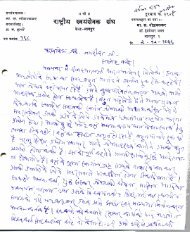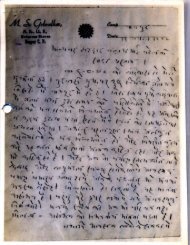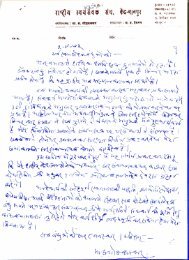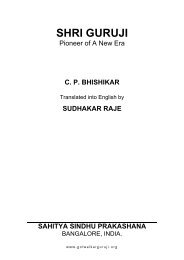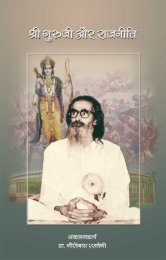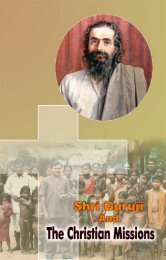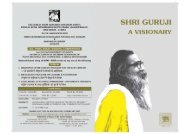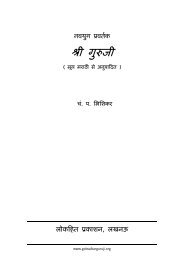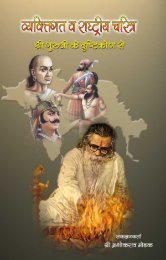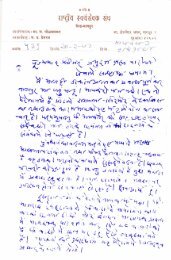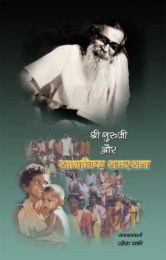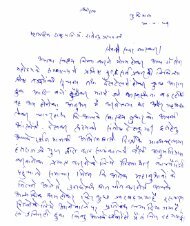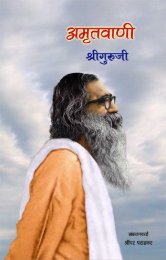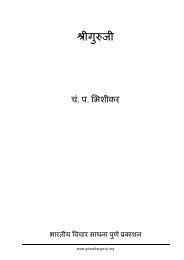Shri Guruji and Indian Muslim.pdf - Shri Golwalkar Guruji
Shri Guruji and Indian Muslim.pdf - Shri Golwalkar Guruji
Shri Guruji and Indian Muslim.pdf - Shri Golwalkar Guruji
Create successful ePaper yourself
Turn your PDF publications into a flip-book with our unique Google optimized e-Paper software.
Introduction<br />
The cultural nationalism has been a central theme in <strong>Indian</strong> social <strong>and</strong> political discourse<br />
since late 19 th century. A galaxy of thinkers, spiritual personalities <strong>and</strong> philosophers, which<br />
included people like Rajaram Mohan Roy, Swami Vivekan<strong>and</strong>a, Maharshi Aurovindo, B. C.<br />
Pal, Lala Lajpat Rai, B. G. Tilak, Mahatma G<strong>and</strong>hi, Bankim Chnadra Chatterjee, Ravindra<br />
Nath Tagore, Dr K. B. Hedgewar, V. D. Savarkar, Swami Dayan<strong>and</strong>a, M. S. <strong>Golwalkar</strong><br />
(<strong>Guruji</strong>), K. M. Munshi , Dr. B. R. Ambedkar, Jawaharlal Nehru, made enormous<br />
contributions to the evolution of idea <strong>and</strong> debate on it in the modern historiography. They<br />
differed with each other on many accounts <strong>and</strong> on their approaches to outline <strong>and</strong> define the<br />
contours of <strong>Indian</strong> nationalism but all of them largely concur that the cultural foundation<br />
gives shape to <strong>Indian</strong> nationalism. All of them perceived patriotism as a spiritual <strong>and</strong> cultural<br />
rather than a material concept. It is obvious from elevation of the country as ‘Mother’ <strong>and</strong><br />
‘Goddess’ by them. Moreover, the acceptance of Bankim’s V<strong>and</strong>e Mataram as a patriotic <strong>and</strong><br />
inspiring song in the collective conscience of the people itself tells that nation has been given<br />
higher status than religions <strong>and</strong> community’s identity. Mother India becomes the most<br />
inspiring <strong>and</strong> living deity irrespective of sects, philosophies, religions <strong>and</strong> regions. However,<br />
there has been a notable absence of <strong>Muslim</strong>s from such debate. Their hostility to this concept<br />
is very remarkable in the trajectory of <strong>Indian</strong> nationalism. Yet it is also not untrue that there<br />
are scattered instances of <strong>Muslim</strong> thinkers <strong>and</strong> literary figures who reinforced the idea of<br />
cultural nationalism. However, the Islamic religious discourses precluded such thinkers to<br />
sustain their ideology or lead to synthesis between indigenous ancestral culture <strong>and</strong> Islamic<br />
faith. Consequently, this could not turn it into an ideology of <strong>Muslim</strong> masses <strong>and</strong> remained<br />
confined to their personal conviction. The <strong>Muslim</strong> discourse has not only been predominantly<br />
based on pan Islam but also on the hostility to indigenous culture as a rival ideology <strong>and</strong><br />
tradition.<br />
The Congress effort to end this predicament of <strong>Indian</strong> nationalism during freedom<br />
movement culminated in the partition of the country. We find resolution of many unanswered<br />
questions in the philosophy of <strong>Shri</strong> <strong>Guruji</strong>. His spiritual self <strong>and</strong> tireless social -activism,<br />
made his thought original <strong>and</strong> pragmatic. He deals with very fundamental issue of<br />
detachment of <strong>Muslim</strong>s from the Hindu culture <strong>and</strong> nationalism. Unlike Pt. Jawaharlal Nehru<br />
there is no gap between his ideas <strong>and</strong> practice. Nehru’s ‘Discovery of India’ <strong>and</strong> his politics<br />
of survival are two extremes of his personality. <strong>Guruji</strong>’s Bunch of Thought is free from such<br />
hypocrisy .It reflects his spiritual mind, activist life <strong>and</strong> optimism of <strong>Indian</strong> tradition. The<br />
most noteworthy aspect of his articulation on <strong>Muslim</strong> question is that his pragmatism does<br />
not kill his optimism <strong>and</strong> idealism. I use the term ‘original’ for his thought on <strong>Muslim</strong><br />
question because he discusses issues <strong>and</strong> events, past, present <strong>and</strong> future of <strong>Muslim</strong>s in<br />
civilisational <strong>and</strong> cultural perspective unmindful of dominant political ideology on the one<br />
h<strong>and</strong> <strong>and</strong> populist approach to <strong>Muslim</strong> problem on the other. He applies practical wisdom to<br />
look into problems <strong>and</strong> their solutions rather than following either sheer conservative<br />
idealism or dogmatism. He rarely quotes philosophers <strong>and</strong> scriptures.<br />
In spite of his open <strong>and</strong> liberal perspective on the question of nationalism <strong>and</strong> secularism,<br />
he has been treated most unfavourably by Islamic scholars <strong>and</strong> secularist social scientists.<br />
Selective <strong>and</strong> out of context citation of his views is unparallel in <strong>Indian</strong> academic. They<br />
largely quoted a treatise “We or Our Nationhood Defined” which was published in 1939. A<br />
baffled <strong>and</strong> elusive domestic <strong>and</strong> international politics certainly influenced the contents of the<br />
book. Not much water has flown down the river of Gangas since <strong>Guruji</strong> was introduced in the<br />
ideological mission of the RSS. The fact is that the book ‘We…’ neither represents the views



